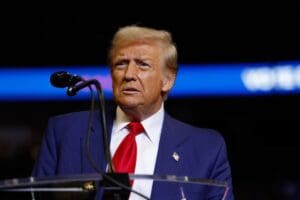
Donald Trump has threatened European Union member states with punitive tariffs if they fail to purchase more American oil and gas, reviving the prospect of a renewed transatlantic trade war.
On Friday, the president-elect declared on social media: “I told the European Union that they must make up their tremendous deficit with the United States by the large scale purchase of our oil and gas. Otherwise, it is TARIFFS all the way!!!”
The warning comes as Mr Trump insists the EU reduce its trade surplus with the US, which stood at $131 billion (£105 billion) last year. He is expected to press for a more balanced trade relationship, wielding the threat of tariffs on European exports unless the EU buys more American goods and services.
The stance could pose a delicate challenge for Britain, with the incoming US ambassador Lord Mandelson likely to devote considerable diplomatic effort to staving off a full-blown trade conflict while trying to keep both the EU and the US in accord.
Mr Trump’s tough rhetoric recalls his previous presidency, when he imposed tariffs on EU steel and aluminium and threatened further duties on German car imports. That period sparked a flurry of transatlantic tensions, countermeasures by the EU on products like Harley-Davidson motorcycles and denim, and a temporary truce in 2018.
This latest escalation signals a potential return to tit-for-tat tariffs. After being caught off guard before, EU officials have since refined their trade defence capabilities to respond more swiftly to US pressure, should it arise. In November, German Foreign Minister Annalena Baerbock noted that Europe is “well-prepared” for a scenario where Washington revives its “America first” policies, vowing a unified European response.
The EU has also introduced rules enabling it to exclude foreign firms benefiting from state subsidies from tendering for public contracts or pursuing takeovers within the bloc—an insurance policy against what it views as unfair competition.
Mr Trump has frequently criticised European nations for relying on the US security umbrella while spending too little on their own defence, and has accused them of exploiting America’s economic generosity through substantial trade surpluses. Brussels, the EU’s political heart, has been called a “hellhole” by the president-elect, who has threatened to stand back and let Russia “do whatever the hell they want” should Nato countries fail to invest adequately in their militaries.
These latest tariff threats are not solely aimed at the EU. Mr Trump has also targeted China and close allies like Canada, which he has jokingly described as “another US state.” In a move to hedge against these threats, some LNG (liquefied natural gas) buyers, including EU member states and Vietnam, have already discussed increasing their purchases from the US.
The US remains the world’s largest crude oil producer and top exporter of LNG. More than half of American LNG exports went to Europe last year, though the EU has sought energy supply diversification, signing agreements with other producers such as Qatar. The urgency for alternatives heightened after Russia’s invasion of Ukraine exposed the EU’s vulnerability due to its previous reliance on Russian energy.
Given Mr Trump’s known enthusiasm for the word “tariff,” long viewed by him as a key strategic tool, European governments may now find themselves caught between diplomatic negotiations and the threat of sudden trade penalties. This climate of uncertainty raises the stakes for EU leaders, who must balance the need to secure stable energy supplies with the imperative to maintain cordial trading relationships with Washington.
Read more:
Trump issues fresh trade threat: buy american oil or face heavy tariffs, eu told






